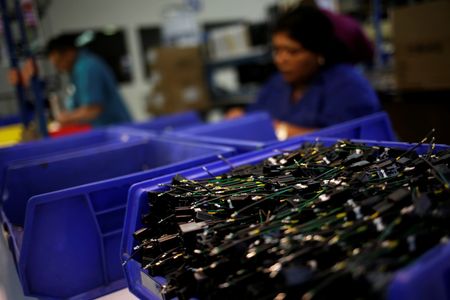MEXICO CITY (Reuters) -Mexico’s auto parts production will likely hit a record of nearly $107 billion this year, up almost 13% from last year, the director of the national auto parts lobby INA announced on Tuesday.
Mexico’s massive car making and auto parts sector is a key driver for the country’s manufacturing industry, which is heavily integrated into U.S. and Canadian supply chains.
INA director Alberto Bustamante told reporters he expects the value of production to rise to about $109 billion next year and then surpass $110 billion in 2024.
“The trade war the United States has with China is a huge factor,” he said, pointing also to growing investment from Chinese companies into Mexico as well as U.S. incentives for Mexican-made vehicles and the North American free trade pact.
Bustamante also said output should benefit from a recovery from semiconductor shortages. INA estimated that some 285,578 Mexican vehicles this year were impacted by the shortages.
Across North America, this figure reaches 726,392 vehicles, INA said, a 70% reduction from last year.
However, Bustamante highlighted that a top industry challenge next year would be securing semiconductor supplies, as well as meeting a May 1 government deadline to ratify collective contracts.
Within the Mexican market, the country’s Association of Automobile Distributors (AMDA) said sales rose 15% in the first 11 months of 2022, with over a third of the market dominated by Nissan, General Motor’s Chevrolet and Toyota .
Mexico’s Auto Industry Association (AMIA) meanwhile reported an 8% production jump in November, though exports – which are mainly destined for the United States – slipped 3.8% in the month.
Industry representatives also voiced concerns about extended regularization of so-called “chocolate cars” – illegally imported used vehicles – which they argued was pushing down used car prices and benefiting criminal gangs.
(Reporting by Aida Pelaez-Fernandez and Sarah Morland; Editing by David Alire Garcia and Andrea Ricci)

